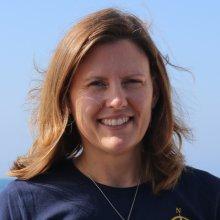
Jennifer Brown
Tell us about your work/research. What kinds of things do you do?
I have been contracting with Monterey Bay National Marine Sanctuary for over 14 years so I have worked on many sanctuary projects during that time. For the last few years, I've been part of a multidisciplinary team of scientists and resource managers who are developing a Marine Biodiversity Observation Network (MBON) project focused on sanctuaries. The Sanctuaries MBON project is working to integrate data from existing long-term monitoring programs with new observations to improve our understanding of changes in and connections between marine biodiversity and ecosystem function. These new biodiversity observations and tools will help address the sanctuary's need for information to answer the question "What is the condition of the sanctuary and how is it changing?" We are also working to make observing information more readily available to resource managers, researchers, teachers, and the public.
What sparked your initial interest in your career?
As a kid, I loved catching and observing bugs, tadpoles, and other creatures, and watching nature shows on television. At first, I wanted to be a veterinarian but then shows like Jacques Cousteau's sparked a strong interest in oceans. That interest continued to grow during my undergraduate studies in the Biology department at UCLA. I had the amazing opportunity to attend two Marine Biology Quarters, one at the Bodega Marine Laboratory and one at the Hawaii Institute of Marine Biology. Living at these marine labs surrounded with other students who were just as excited as me about learning marine biology and doing fieldwork and laboratory experiments, I realized that I had found the place for me.
Who influenced you or encouraged you the most?
My parents never seemed to mind that I was bringing home bugs, lizards or whatever else I could catch. Later on, they were always supportive of my choice to study marine ecology.
What element of your work/study do you think is the most fascinating?
I really enjoy that my job is to pull together information on all the different parts of the sanctuary ecosystem - from the rocky shores to the deep sea and whales to seagrass. I am constantly learning new thing based on all the amazing research and exploration that is happening in sanctuaries
What other jobs led you to your current career?
I enjoy working at the intersection of science, education and management and the sanctuary program helps me do just that. There are many different jobs and experiences that helped me discover this career path. In 5th grade, I volunteered at the local wildlife hospital and museum and just loved learning about and caring for the animals. One summer between years at UCLA, I had a paid intern at the Monterey Bay Aquarium where I loved interacting with the visitors and doing education outreach programming on the ecology of Monterey Bay. While in graduate school I had another internship, this time with the Monterey Bay National Marine Sanctuary which highlighted for me the important job of applying current scientific research to improving management of our natural resources.
What are your degrees and certifications?
I have a Bachelor of Science Degree in Biology from the University of California at Los Angeles and a Doctorate Degree in Ecology and Evolutionary Biology from the University of California at Santa Cruz.
What are your hobbies?
I enjoy swimming, hiking, biking and getting out on the water. I love to garden and harvest yummy homegrown fruits and veggies. For the last 3+ years, I have volunteered at my children's elementary school by leading some marine biology lessons, helping expand sustainable practices, and helping to start a school garden program.
What advice would you give to someone who wants to have a career like yours?
Take advantage of opportunities related to what excites you because you never know where it will lead. It may be hard to get that first job, so you may need to volunteer on weekends for a citizen science program cataloging tide pool creatures or counting fish while diving in kelp forests. Taking that low paying internship for the summer, while having a second job on the side, could be the step you need to take to get that full-time job. These opportunities will help you identify what you enjoy doing and meet people with similar interests; often they also lead to bigger and better things.
How did you get involved with the Nautilus Exploration Program?
I am participating in this cruise as part of the science team that has been working to better characterize and assess the habitats, species, and communities in Monterey Bay National Marine Sanctuary.
Expeditions
Jennifer participated in the following Ocean Exploration Trust expeditions:
